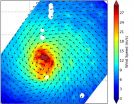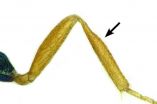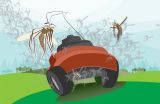(Press-News.org) Family members who make major medical decisions for relatives in an intensive care unit (ICU) may suffer posttraumatic stress disorder (PTSD) if they cope by avoiding the situation, according to a new study by scientists at Case Western Reserve University's Frances Payne Bolton School of Nursing.
The patient isn't the only one affected by the long stay, according to Amy Petrinec, from the school of nursing. Family members may suffer, especially if they're required to make medical decisions with long-range consequences they may not understand, or are reluctant to question.
Family members tasked with the difficult and emotional role of decision-maker are better off health-wise dealing with the experience, advised Petrinec, RN, PhD, a postdoctoral fellow and the study's lead researcher.
If not, they may struggle with guilt about whether they had done the right thing, Petrinec said, which stresses the importance of having a living will, or, at least discussions about someone's wishes in case of major illness.
The study
Petrinec and her team studied three coping styles for family decision-makers--emotional, problem-solving and avoidance coping.
Emotional coping involves seeking emotional support or comfort from others, making jokes to lighten the situation or trying to see the situation in a new way.
Problem-solving is action-driven by seeking information, making a plan and getting help or advice.
Avoidance coping is not thinking or doing anything about the situation, drinking or using drugs to obliterate thoughts and denying the reality of the situation.
"We use all of these coping skills to one level or another in different situations," Petrinec said, "but people usually employ one predominant coping strategy in a particular situation."
Petrinec surveyed 77 people about their initial coping skills three to five days after a family member entered the medical, surgical or neurological ICU in a large urban hospital, and then 30 days later to see if their coping strategies changed. Sixty days later, she tested them for PTSD.
Findings
She found 42 percent of family decision-makers had clinically significant PTSD symptoms. Death of the patient was a strong factor in predicting PTSD in the family decision-makers, regardless of coping style.
Details of the study and their findings were published in Critical Care Medicine.
The Society of Critical Care Medicine has raised concerns about individuals who develop what is called Post-Intensive Care Syndrome (PICS)--a change in physical, mental or cognitive functions after a long stay in the ICU.
The condition has become more prevalent as improved medical care has allowed people with chronic illnesses to live longer, Petrinec said.
INFORMATION:
School of Nursing scientists Christopher Burant, PhD, and Barbara J. Daly, PhD, RN, with Alan Hoffer, MD, from the Department of Neurosurgery at University Hospitals Case Medical Center, contributed to the study, which was funded by the National Institutes of Health (5NR01NR013322).
(NEW YORK CITY - July 22, 2015) Is it possible that too much iron in infant formula may potentially increase risk for neurodegenerative diseases like Parkinson's in adulthood -- and are teeth the window into the past that can help us tell? This and related theories were described in a "Perspectives" article authored by researchers from the Icahn School of Medicine at Mount Sinai and the University of Technology Sydney and Florey Institute of Neuroscience and Mental Health in Australia, and published online recently in Nature Reviews Neurology.
"Teeth are of particular ...
LOS ANGELES (July 22, 2015) - For the first time, researchers have employed a gene-editing technique involving low-dose irradiation to repair patient cells, according to a study published in the journal Stem Cells Translational Medicine. This method, developed by researchers in the Cedars-Sinai Board of Governors Regenerative Medicine Institute, is 10 times more effective than techniques currently in use.
"This novel technique allows for far more efficient gene editing of stem cells and will increase the speed of new discoveries in the field," said co-senior author Clive ...
WASHINGTON, D.C. - Coral reefs, under pressure from climate change and direct human activity, may have a reduced ability to protect tropical islands against wave attack, erosion and salinization of drinking water resources, which help to sustain life on those islands. A new paper gives guidance to coastal managers to assess how climate change will affect a coral reef's ability to mitigate coastal hazards.
About 30 million people are dependent on the protection by coral reefs as they live on low-lying coral islands and atolls. At present, some of these islands experience ...
Poor schools that have more black and minority students tend to punish students rather than seek medical or psychological interventions for them, according to a Penn State sociologist.
"There's been a real push toward school safety and there's been a real push for schools to show they are being accountable," said David Ramey, assistant professor of sociology and criminology. "But, any zero-tolerance policy or mandatory top-down solutions might be undermining what would be otherwise good efforts at discipline, and not establishing an environment based around all the options ...
BEER-SHEVA, Israel...July 22, 2015 - Ben-Gurion University of the Negev (BGU) and University of Colorado researchers have developed a dynamic "smart" drug that targets inflammation in a site-specific manner and could enhance the body's natural ability to fight infection and reduce side effects.
The uniqueness of this novel anti-inflammatory molecule, reported in the current issue of Journal of Immunology, can be found in a singular property. When injected, it is as a non-active drug. However, a localized site with excessive inflammation will activate it. Most other anti-inflammatory ...
Edward Snowden's leak of classified documents to journalists around the world about massive government surveillance programs and threats to personal privacy ultimately resulted in a Pulitzer Prize for public service.
Though Snowden had no intention of hiding his identity, the disclosures also raised new questions about how effectively news organizations can protect anonymous sources and sensitive information in an era of constant data collection and tracking.
A new study by University of Washington and Columbia University researchers that will be presented next month ...
Amsterdam, The Netherlands, July 22, 2015 - In a large population-based study of randomly selected participants in Germany, researchers found that mild cognitive impairment (MCI) occurred significantly more often in individuals diagnosed with a lower ankle brachial index (ABI), which is a marker of generalized atherosclerosis and thus cumulative exposure to cardiovascular risk factors during lifetime. Interestingly, this strong association was only observed in patients with non-amnestic MCI, but not amnestic MCI. There also was no independent association of MCI and intima ...
Typhoon Halola's strongest typhoon-force winds were located on the northern half of the storm, as identified from the RapidScat instrument that flies aboard the International Space Station.
RapidScat gathered surface wind data on the Typhoon Halola on July 21at 2 p.m. GMT (10 a.m. EDT). RapidScat data showed that the strongest sustained winds stretched from northwest to northeast of the center at speeds up to 30 meters per second (108 kph/67 mph). Strong winds wrapped around the center of circulation from northwest to east to the southern quadrant, while the weakest winds ...
Much to his own surprise, Hannes Baur from the Natural History Museum Bern not only reports on whole two new parasitoid wasps at the heart of Europe, the Swiss Alps and Swiss Central Plateau. While the common discovery usually involves cryptic, or "camouflaging" within their groups species, his stand out. Baur's work is published in the open-access journal ZooKeys.
The insects he describes are visibly quite unique with their body structures. In the case of the Pteromalus briani wasp, its extraordinarily protruding hind legs differentiate it among the whole family. Meanwhile, ...
CHAMPAIGN, Ill. -- A study of the West Nile virus risk associated with "dry" water-detention basins in Central Illinois took an unexpected turn when land managers started mowing the basins. The mowing of wetland plants in basins that failed to drain properly led to a boom in populations of Culex pipiens mosquitoes, which can carry and transmit the deadly virus, researchers report.
A paper describing their findings is in press in the journal Ecological Applications.
The team, led by University of Illinois postdoctoral researcher Andrew Mackay, found that mowing down cattails ...


